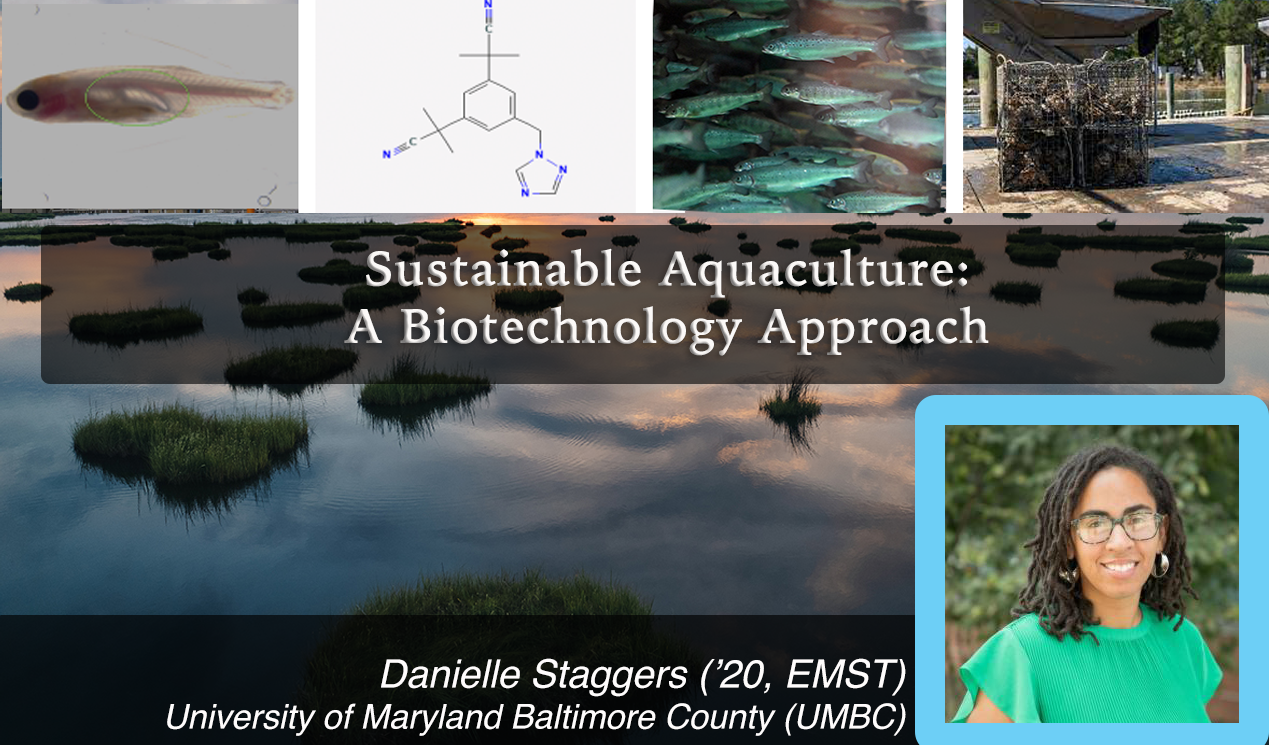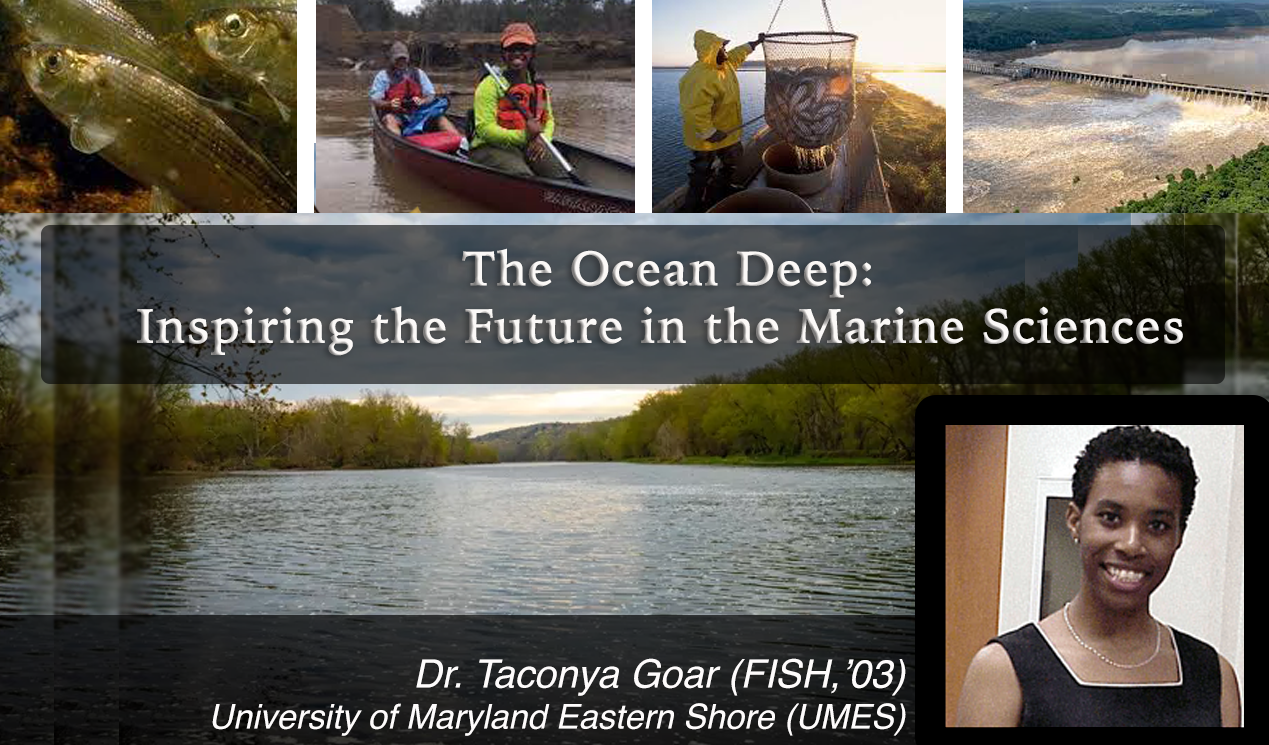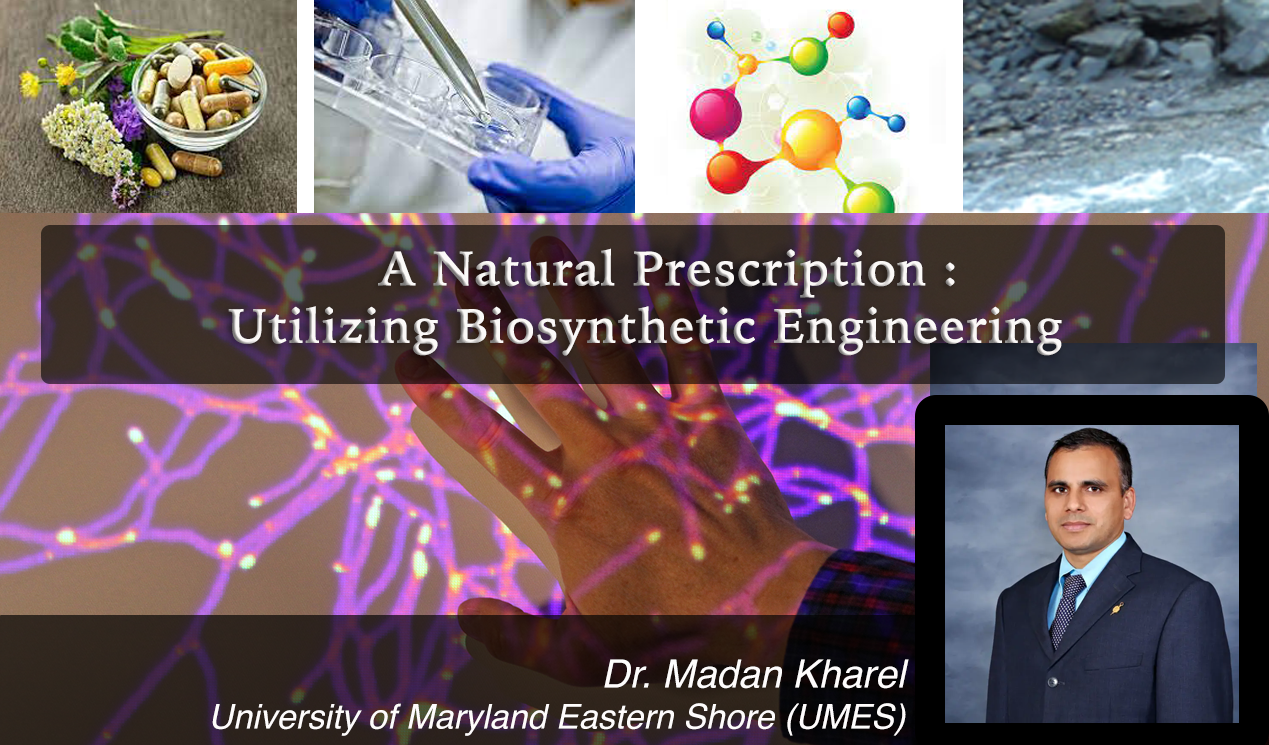ALUMNI CORNER
MEES RESEARCH CENTER
Danielle Staggers. Photo Courtesy: UMBC/IMET
Danielle Staggers (‘20, EMST) is a fourth year MEES Ph.D. doctoral student at the University of Maryland, Baltimore County. Advised by Dr. Tsen Tsao Wong, Danielle’s research focuses on addressing the challenge of renewable global food systems by exploring sustainable aquaculture strategies through the biocontrol and preservation of wild-type fish, like the Atlantic salmon, using the transgenic zebrafish as the test species.
Taconya. Goar (Piper) Photo Courtesy: UMES
Dr. Taconya Goar (Piper) (FISH, MS '03) is a Fisheries Biologist at the Federal Energy Regulatory Commission where she is currently analyzing and providing recommendations on a wide variety of fish biology issues associated with the construction and operation of hydropower facilities and proposing recommendations to avoid, minimize, and mitigate impacts.
, poultry and mitigating climate change: an environmental sustainability assessment
Dr. Jonathan Cummings Photo Courtesy: UMES
January 23, 2024 - Dr. Jonathan Cummings is professor and chair of the Department of Natural Sciences at the University of Maryland Eastern Shore. A recently appointed MEES faculty member, Dr. Cummings leads the keystone STEM department serving students from the Delmarva Peninsula, the State of Maryland, the region, country, and many nations. Dr. Cummings is also a team leader in the Center for Bioenergy Innovation (CBI) through Oak Ridge National Laboratory, a research role focused on solving complicated plant-soil interactions associated with producing sustainable biofeedstocks for the bioenergy sector. Dr. Cummings was recently featured in an UMES article, regarding leading a USDA Natural Resources Conservation Service funded project, which centers around the byproducts of anaerobically digested chicken litter, which is organically broken down bacteria used as biofuel and fertilizer on cover cropped fields, particularly switchgrass, as a source of sustainable biomass feedstock. According to the UMES article, this five (5) year, $5M grant which is part of USDA-NRCS’s Partnership for Climate Smart Commodities program, looks to “utilize the abundance of litter to boost sustainable biogas production”, particularly at local facilities, in an effort to “mitigate climate change factors and create new streams of revenue for farmers.” This project aims to “identify cultivars”, which are plant varieties that have been produced in cultivation by selective breeding. For instance: broccoli, cauliflower, cabbage and kale (among others) have all been derived from the wild mustard plant through the selective breeding process. The goal is to develop plants that “can be grown on marginal soils, including those affected by saltwater intrusion, bringing more land into production for farmers” Cummings said in the article. These perennial cultivars capture atmospheric carbon dioxide and transfers this carbon to the soil due to its extensive root systems, unlike regular cover crops. According to the article:
“This carbon enters the soil ecosystem where it is stabilized and stored for the long term,” Cumming added, “which gets it out of the atmosphere where it contributes to the greenhouse effect.” Ultimately, this and other climate-smart practices will help mitigate climate change and reduce the associated impacts on temperatures and extreme weather events. (link here)
This project is also in partnership with the University of Maryland, College Park, and the Planet Found Energy Development LLC in Pocomoke City, a subsidiary of Chesapeake Energy Corp. For more information on Dr. Jonathan Cummings, please click here.
the ocean deep:
Inspiring the future in the marine sciences
taconya goar (‘13, Ph.D, ‘03, M.S.)
Taconya Goar (Piper) (‘03, MS) Photo Courtesy: UMES
Dr. Taconya Goar (Piper) (FISH, MS '03) is a Fisheries Biologist at the Federal Energy Regulatory Commission where she is currently analyzing and providing recommendations on a wide variety of fish biology issues associated with the construction and operation of hydropower facilities and proposing recommendations to avoid, minimize, and mitigate impacts. Taconya graduated with her doctoral degree in Fisheries Science and Management at Auburn University in 2013. Prior to that, Taconya earned her Master’s in MEES from the University of Maryland Eastern Shore in Spring 2003, graduating with honors (magna cum laude). Under the advisement of Dr. Roman Jesien, who is now a Science Coordinator with the Maryland Coastal Bay Program, Taconya’s thesis investigated the reproductive potential of American shad, Alosa sapidissima, or herring, in the Delaware and Hudson rivers. Prior to the joining the MEES Program, this local Oxon Hill, Maryland native graduated with her Bachelor’s in Environmental Science from the University of Maryland, Eastern Shore in Fall 1999 where she garnered a wealth of research experience which includes working during the summer as part of the Minorities in Marine and Environmental Sciences (MIMES) program as an intern at the South Carolina Marine Resources Division (SCMRD). Taconya conducted an independent research project on the fecundity and spawning frequency of the spotted seatrout in Charleston Harbor, South Carolina with in shore fisheries scientists. Taconya had the opportunity to present the results of that research at that year’s Estuarine Research Foundation (ERF) conference in New Orleans, Louisiana. Taconya also had the opportunity to work as a research fishery biologist in the Student Career Experience Program (SCEP) through NOAA's National Marine Fisheries Service. The following year, in 2000, Taconya entered the Master’s program in the Marine Estuarine Environmental Sciences Program (with a specialization in Fisheries Science) at UMES where she was awarded the Dean John A. Knauss Marine Policy Fellowship sponsored by the National Sea Grant Program and spent a year in Washington DC with NOAA’s Office of Ocean Exploration learning environmental policy and management. Taconya also participated in a three-week research cruise to the Puerto Rico Trench to map the seafloor. Reflecting on that experience, in a UMES article Taconya said, “We got some great images and I learned a lot. The experience was just awesome.” During a September 2003 NOAA research cruise in the Gulf of Mexico, Taconya worked with scientists aboard the NOAA Ship Ronald H. Brown gathering background information, daily logs and supplemental essays on topics that centered on the expedition. Work from this investigation was featured in the Nov/Dec 2003 issue of Underwater Magazine where daily diary entries (Deep Sea Diary) of the expedition were co-authored by Ms. Piper. After graduating with her doctorate, Taconya went on to work for over eight years as an Environmental Supervisor with the Alabama Department of Conservation and Natural Resources. Dr. Goar joined the Federal Energy Regulatory Commission in 2020 as a Fisheries Biologist and is experienced with preparing Environmental Impact Statements (EIS) and Environmental Assessments pursuant to the National Environmental Policy Act (NEPA) while also planning, executing, moderating and making presentations at the federal, state and local government meetings as well as at stakeholder meetings and conferences. Dr. Goar’s passion is focused on the development of education and outreach programs that promote ocean exploration and stewardship to the public. Her personal goal is to implement education and outreach programs that expose inner city youths to the many opportunities for careers in ocean and environmental science. For more on Dr. Goar, please click here.
Dr. Madan Kharel Photo Courtesy: UMES
a natural prescription: utilizing biosynthetic engineering
Dr. Madan Kharel is Assistant Professor of Pharmaceutical Sciences at the University of Maryland Eastern Shore. Dr. Kharel, who recently joined the MEES Faculty early last year in March 2023, joined the UMES Faculty in 2013 and his research is focused on the discovery of actinobacterial natural products from unique ecological niches such as Chesapeake Bay sediments, as well as the elucidation of biosynthetic pathways of select bacterial natural products; novel enzymatic catalysis, biosynthetic pathway engineering, and synthetic biology. Antibiotics discovered in the past century have increasingly become less and less effective with the emergence of antimicrobial resistance. However, like penicillin, natural products, particularly those derived from microbes, have been viewed as an abundant source of lead compounds for new drug discovery. These compounds treat bacterial, fungal, parasitic, and viral infections; Dr. Kharel’s research explores how the engineering of biosynthetic pathways can offer a viable means to the development and discovery of new drugs, particularly in anti-infective and anti-cancer agents. Dr. Kharel graduated with a Bachelor of Biology from Tribhuvan University in Nepal, in 1996. In 1998, he obtained a Master of Science, in Chemistry, from the Central Department of Chemistry, at Tribhuvan University. Dr. Kharel went on to receive his Ph.D. from Sun Moon University, in the Republic of Korea in 2004. After two years of postdoctoral research training, he joined the graduate program at the University of Kentucky, and obtained a Ph.D. in Pharmaceutical Sciences in 2010. As a research associate, and then a research assistant professor, Dr. Kharel continued his research in the area of antibiotics and anticancer drug discovery at the University of Kentucky. He has co-authored over 60 peer-reviewed journal articles. Dr. Kharel joined the UMES faculty in 2013 and is currently advising current MEES graduate students and plans on teaching future MEES courses. For more on Dr. Kharel, please click here.
MEES RESEARCH CENTER
sustainable aquaculture: a biotechnology approach
Danielle Staggers Photo Courtesy: UMBC/IMET
Danielle Staggers (‘20, EMST) is a fourth year MEES Ph.D. doctoral student at the University of Maryland, Baltimore County. Advised by Dr. Tsen Tsao Wong, Danielle’s research focuses on addressing the challenge of renewable global food systems by exploring sustainable aquaculture strategies through the biocontrol and preservation of wild-type fish, like the Atlantic salmon, using the transgenic zebrafish as the test species. Prior to joining the MEES Program, Danielle garnered a wealth of research experience having worked as: an Environmental Specialist with the Federal Emergency Management Agency, an Environmental Chemist with Phase Separation Science, a local Catonsville, MD NELAP certified EPA laboratory where Danielle assisted in a variety of projects including extracting diesel range organics and oil range organics from soils, water and oils as well as performed soil moisture density tests and conducted extractions of sem-volatiles. Danielle also had the opportunity to serve as a Park Ranger for the City of Greenbelt, MD where she proposed a plan for a storm water management area and submitted it for the Keeping Maryland Beautiful Grant program in October 2018. This Tiger alum earned a Bachelor’s of Science in Environmental Science & Studies from Towson University in Spring 2014, where, under the direction of Dr. Harold Beck, Danielle monitored, collected and analyzed microinvertebrates in random deer enclosures in an effort to assess and compare the differences in species and animalia within and without the enclosures. These differences in species and animalia observed provided information on the possible effects of deer presence in forested environments. Danielle went on to earn her Masters of Professional Studies in Biotechnology Management at the University of Maryland, Baltimore County in Spring 2019. While in the MEES Graduate Program, Danielle whose research base is now at the Institute of Marine and Environmental Technology in Baltimore, MD, is currently working with Dr. Tsen Tsao Wong on her dissertation research which is focused on establishing a commercially viable application to produce all female Atlantic Salmon (S. Salar) using transgenic zebrafish as a model. In 2020, over 42% of the seafood consumed was farmed (OECD-FAO), however aquaculture regulations vary internationally, bolstering efforts to ensure environmental and food safety. Danielle is well on her way to achieving her goal of becoming a Marine Biotechnologist, with her dissertation research involving the sterilization of transgenic zebrafish, which is critical in the prevention of accidental release and possible out competing of the wild type fish. The ability to maintain wild fish species allows for the sustained individual fitness of fish and reduces the likelihood of extinction. Danielle’s research also aims to further support the use of transgenic fish for aquaculture purposes and human consumption as a way to provide an ever growing population a sustainable food source. Danielle’s passion is to solve biological issues with the technological advances needed for environmental, biological, and natural resource protection. For more information on Danielle, please click here.








